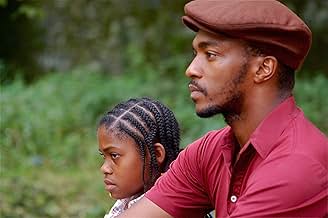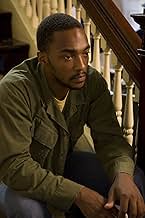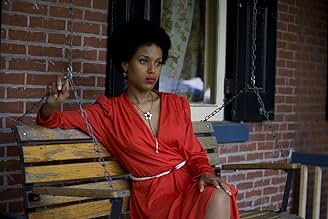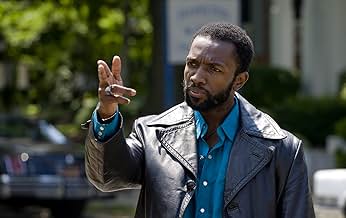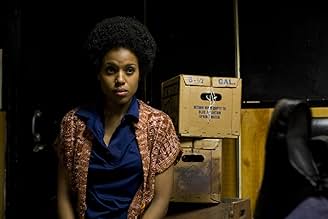NOTE IMDb
6,2/10
1,9 k
MA NOTE
Ajouter une intrigue dans votre langueIn 1976, complex political and emotional forces are set in motion when a young man returns to the race-torn Philadelphia neighborhood where he came of age during the Black Power movement.In 1976, complex political and emotional forces are set in motion when a young man returns to the race-torn Philadelphia neighborhood where he came of age during the Black Power movement.In 1976, complex political and emotional forces are set in motion when a young man returns to the race-torn Philadelphia neighborhood where he came of age during the Black Power movement.
- Réalisation
- Scénario
- Casting principal
- Récompenses
- 8 victoires et 19 nominations au total
Avis à la une
I saw one review on this twisted history movie and had to say something. I lived in this era, I saw the Black Panthers kill a lot of people.I lived in Oakland I saw them burning buildings for no reason except they didn't like the school or the people. I saw them beating up teachers who were trying to help them. The only people killed by these so called 'civilians' were other civilians. The hate was incredible, Oakland turned from a thriving metropolis to a town of empty stores, with newspapers flying in the streets. My whole family lived there my Grandparents were born there and my folks, the town was decent it was full of hard working people. Then the haters moved in and started destroying everything. The city did not help they torn down the Victorian homes that were solid and built slums that had rats within 30 days of occupation because the garbage was everywhere. I saw a whole city implode by shooting and gangs the panthers were just one of many; they were just more talked about than the rest. Anyone who thinks the government was wrong helping the Vietnamese people get away from communist aggression didn't hear the cries for help from them when their cities were destroyed and the people killed in the thousands. We lost only because Congress wouldn't let the military do their job and complete their mission. I know many people from south east Asia that would love to go back to their country if they could worship the way they wanted to without being harassed by the communist regime. Communism isn't pretty! people also forget that the era was full of drugs and immorality it wasn't good and didn't do anything to advance civilization in fact I think it went back a few steps! Docudramas are the bargain basement of movies they take 10 percent real history and 90 percent baloney and everyone thinks it really happened that way! Don't waste your time!
"Night Catches Us" is the best art-house film I've seen in several months. In fact it bests a lot of the current main-screen fare. It deserves better than the quiet and uneven release it seems destined for.
I saw it back-to-back with the Oscar contender "The King's Speech". It balanced the double bill reasonably well. Although "The King's Speech" is of course superior, the comparison wasn't simply ridiculous.
I saw it twice ...which I often do with films I really like, as I tend to miss too many things the first time.
It's not moralistic. Both sides of survival vs. justice, violence vs. pacifism, united front vs. paranoia, victims vs. victimizers, and this generation vs. the next generation are portrayed sympathetically. Although at first glance one particular style of being seems to be being touted over the others, just a little reflection reveals that the film actually revels in moral ambiguity. Some characters manage to stay on the good side of the respectability line at all times, even while their inner demons are picked up and expressed -sometimes in socially unacceptable ways- by others around them. The camera notices more latent contradictions than the story ever delves into. For example the reverend was apparently beloved by the neighborhood, yet also lived in by far the finest house in the whole area.
The film isn't a polemic and doesn't seem to consciously attempt to portray cops in a bad light. Yet it doesn't shy away from sketches of substantial police bad attitude and violence.
"Night Catches Us" makes liberal use of art-house stylistic conventions. For example the confused, tangled, and partially submerged thoughts of a character are portrayed not by talking about them or even by seeing them in action, but by long leisurely shots from underneath of the crossed branches of overgrown vegetation. For another example, a character's longing for stability and tranquility is portrayed by lengthy shots of the proverbial babbling brook.
I wasn't irritated by the pacing. The film is by no means an action flick or a taut thriller, but I didn't find it like watching paint dry either. I tend to like slower paced films anyway (which of course doesn't mean everybody else will too:-). The most similarly paced movie that comes to mind is Clint Eastood's recent "Hereafter"; if you thought that was impossibly slow you'll probably have the same reaction to "Night Catches Us", but if that character exposition and portrayal of small events grabbed you this likely will too.
All the action takes place over just a few days in 1976. A block of important events that happened about a decade earlier is described mainly through bits of dialog. There are no visual flashbacks nor dream sequences (except of course for the occasional interspersed archival Black Panthers footage).
I found the acting quite good. It doesn't bowl you over as the greatest thing you've seen in years; but it's by no means "just workmanlike". Quite often meaning is communicated not by dialog but by subtle body language or facial expressions, which the actors seem fully up to. Both the individual characters and the chemistry between the characters are believably convincing.
I found the situation (or plot if you prefer to think of it that way) simple and complex at the same time. It's simple in that once you finally grasp it you can describe the whole thing in one short paragraph, and in that if you're one of those people who instantly "get" most movie clues you might be able to divine the whole thing well in advance. On the other hand it's complex in that it's revealed only one tiny bit at a time -sometimes in dialog and sometimes visually- so the whole movie can become a "mystery" to be solved if that's your preference.
I saw it back-to-back with the Oscar contender "The King's Speech". It balanced the double bill reasonably well. Although "The King's Speech" is of course superior, the comparison wasn't simply ridiculous.
I saw it twice ...which I often do with films I really like, as I tend to miss too many things the first time.
It's not moralistic. Both sides of survival vs. justice, violence vs. pacifism, united front vs. paranoia, victims vs. victimizers, and this generation vs. the next generation are portrayed sympathetically. Although at first glance one particular style of being seems to be being touted over the others, just a little reflection reveals that the film actually revels in moral ambiguity. Some characters manage to stay on the good side of the respectability line at all times, even while their inner demons are picked up and expressed -sometimes in socially unacceptable ways- by others around them. The camera notices more latent contradictions than the story ever delves into. For example the reverend was apparently beloved by the neighborhood, yet also lived in by far the finest house in the whole area.
The film isn't a polemic and doesn't seem to consciously attempt to portray cops in a bad light. Yet it doesn't shy away from sketches of substantial police bad attitude and violence.
"Night Catches Us" makes liberal use of art-house stylistic conventions. For example the confused, tangled, and partially submerged thoughts of a character are portrayed not by talking about them or even by seeing them in action, but by long leisurely shots from underneath of the crossed branches of overgrown vegetation. For another example, a character's longing for stability and tranquility is portrayed by lengthy shots of the proverbial babbling brook.
I wasn't irritated by the pacing. The film is by no means an action flick or a taut thriller, but I didn't find it like watching paint dry either. I tend to like slower paced films anyway (which of course doesn't mean everybody else will too:-). The most similarly paced movie that comes to mind is Clint Eastood's recent "Hereafter"; if you thought that was impossibly slow you'll probably have the same reaction to "Night Catches Us", but if that character exposition and portrayal of small events grabbed you this likely will too.
All the action takes place over just a few days in 1976. A block of important events that happened about a decade earlier is described mainly through bits of dialog. There are no visual flashbacks nor dream sequences (except of course for the occasional interspersed archival Black Panthers footage).
I found the acting quite good. It doesn't bowl you over as the greatest thing you've seen in years; but it's by no means "just workmanlike". Quite often meaning is communicated not by dialog but by subtle body language or facial expressions, which the actors seem fully up to. Both the individual characters and the chemistry between the characters are believably convincing.
I found the situation (or plot if you prefer to think of it that way) simple and complex at the same time. It's simple in that once you finally grasp it you can describe the whole thing in one short paragraph, and in that if you're one of those people who instantly "get" most movie clues you might be able to divine the whole thing well in advance. On the other hand it's complex in that it's revealed only one tiny bit at a time -sometimes in dialog and sometimes visually- so the whole movie can become a "mystery" to be solved if that's your preference.
NIGHT CATCHES US is a gripping film that reminds us of the importance of the Black Panther Movement. Historical distance and changes in this country may have numbed the memory of a social movement as an important racial equality step and the very words 'Black Panther' are unfortunately tainted with the radical ugly aspects. But Tanya Hamilton has written and directed this compelling movie NIGHT CATCHES US and hopefully the core meaning of the movement will gain respect in the minds of those fortunate to see this brilliant little film. In order to help those who are unfamiliar with this movement a brief history may help appreciate this film. 'The Black Panther Party (originally the Black Panther Party for Self- Defense) was an African-American revolutionary leftist organization. It was active in the United States from the mid-1960s into the 1970s. The Black Panther Party achieved national and international impact through their deep involvement in the Black Power movement and in US politics of the 1960s and 70s, as the intense anti-racism of the time is today considered one of the most significant social, political and cultural currents in US history. The group's "provocative rhetoric, militant posture, and cultural and political flourishes permanently altered the contours of American Identity. Founded in Oakland, California, by Bobby Seale and Huey P. Newton on October 15, 1966, the organization initially set forth a doctrine calling primarily for the protection of African American neighborhoods from police brutality. But the Black Panther Party's objectives and philosophy expanded and evolved rapidly during the party's existence. The organization's leaders passionately espoused socialist and communist (largely Maoist) doctrines, but the Party's black nationalist reputation attracted an ideologically diverse membership. Ideological consensus within the party was difficult to achieve, and some prominent members openly disagreed with the views of the leaders.'
The year is 1976 and Marcus Washington (Anthony Mackie, in a brilliant role) returns to Philadelphia after serving a jail term. He is without a job or place to stay and his father has just died, leaving the old family house to his brother who has sold it. Marcus sees his old friend Pattie -now Patricia - Wilson (Kerry Washington, likewise in a moving performance) who had been married to and had a child Iris (Jamara Griffin) by his best friend who was brutally murdered by the police in his own home. Marcus' arrival in the neighborhood (essentially unchanged from the height of the Black Panther days) and branded a 'Snitch' by his old friends: they believe Marcus informed the police of his friend's killing of a police officer and blame his friend's death on him. Patricia is now a lawyer and spends her days defending young black men and her time off supplying food and shelter to the parentless children of the neighborhood. Her nephew Jimmy (Amari Cheatom) has inherited the anger of the past and Patricia must frequently bail him out of jail for arrests for 'verbal abuse' of police officers. Though Patricia has a live-in lawyer boyfriend Carey Ford (Ron Simons) who helps her in her drive to better the lives of the neighborhood, once Patricia and Marcus rekindle their past friendship (and more), Carey moves out and Marcus moves in. Together Marcus and Patricia share the cause of the death of Iris' father with the bright young girl, an incident that draws the three of them closer. But old hates still exist and the bloody aspects of the Panther Movement appear to rekindle because of Marcus' presence. Marcus is approached by a black police captain Wendell Pierce (David Gordon) to infiltrate Marcus major enemy 'Do Right' Miller (Jamie Hector), but Marcus sees through the age old struggle between the neighborhood and the police, remembers the anguish of the past, and refuses to carry out the planting of evidence. After a scene of the Truth in the retelling of the history of Iris' father's murder - Patricia and Marcus finally face the past - and Marcus moves on.
To give more details of the story would distract from the power of the message. This is a movie that simply should be seen to put that period of time in perspective. The cast is particularly fine, not only Mackie and Washington, but also the young and very talented Amari Cheatom among others. One wonders why the sound track doesn't reflect the music from that period, instead using contemporary rap music, but that is a very small defect in an otherwise VERY fine film.
Grady Harp
The year is 1976 and Marcus Washington (Anthony Mackie, in a brilliant role) returns to Philadelphia after serving a jail term. He is without a job or place to stay and his father has just died, leaving the old family house to his brother who has sold it. Marcus sees his old friend Pattie -now Patricia - Wilson (Kerry Washington, likewise in a moving performance) who had been married to and had a child Iris (Jamara Griffin) by his best friend who was brutally murdered by the police in his own home. Marcus' arrival in the neighborhood (essentially unchanged from the height of the Black Panther days) and branded a 'Snitch' by his old friends: they believe Marcus informed the police of his friend's killing of a police officer and blame his friend's death on him. Patricia is now a lawyer and spends her days defending young black men and her time off supplying food and shelter to the parentless children of the neighborhood. Her nephew Jimmy (Amari Cheatom) has inherited the anger of the past and Patricia must frequently bail him out of jail for arrests for 'verbal abuse' of police officers. Though Patricia has a live-in lawyer boyfriend Carey Ford (Ron Simons) who helps her in her drive to better the lives of the neighborhood, once Patricia and Marcus rekindle their past friendship (and more), Carey moves out and Marcus moves in. Together Marcus and Patricia share the cause of the death of Iris' father with the bright young girl, an incident that draws the three of them closer. But old hates still exist and the bloody aspects of the Panther Movement appear to rekindle because of Marcus' presence. Marcus is approached by a black police captain Wendell Pierce (David Gordon) to infiltrate Marcus major enemy 'Do Right' Miller (Jamie Hector), but Marcus sees through the age old struggle between the neighborhood and the police, remembers the anguish of the past, and refuses to carry out the planting of evidence. After a scene of the Truth in the retelling of the history of Iris' father's murder - Patricia and Marcus finally face the past - and Marcus moves on.
To give more details of the story would distract from the power of the message. This is a movie that simply should be seen to put that period of time in perspective. The cast is particularly fine, not only Mackie and Washington, but also the young and very talented Amari Cheatom among others. One wonders why the sound track doesn't reflect the music from that period, instead using contemporary rap music, but that is a very small defect in an otherwise VERY fine film.
Grady Harp
I'd encourage anyone interested in watching good acting and film-making to watch "Night Catches Us".
The movie is set in 1976, in Philadelphia, and it is not "Rocky's" S. Philadelphia. The main characters have all had experience/involvement in the Black Panther movement, and the movie cuts a path through the complex feelings and realities that have evolved since they were once involved with it.
It's one of those films that revolves around a core group of characters who've all turned into somewhat different people from when they first knew each other. The dynamic is even more intense because each of the main characters has a tie-in to someone who was obviously a leader or loved one -- indeed it was his death years earlier that led the group to disperse.
I'm kinda bummed that awards seasons might be passing by this gem. Kerry Washington is great, but it's Anthony Mackie's film; he has an intensity and dignity. No overwrought acting.
The movie is set in 1976, in Philadelphia, and it is not "Rocky's" S. Philadelphia. The main characters have all had experience/involvement in the Black Panther movement, and the movie cuts a path through the complex feelings and realities that have evolved since they were once involved with it.
It's one of those films that revolves around a core group of characters who've all turned into somewhat different people from when they first knew each other. The dynamic is even more intense because each of the main characters has a tie-in to someone who was obviously a leader or loved one -- indeed it was his death years earlier that led the group to disperse.
I'm kinda bummed that awards seasons might be passing by this gem. Kerry Washington is great, but it's Anthony Mackie's film; he has an intensity and dignity. No overwrought acting.
"Night Catches Us" is a movie written and directed by Tanya Hamilton. It seeks to tell the story of a Philadelphia neighborhood and how it was shattered by the police killing of a Black Panther Party member. The movie takes place in 1976 where we see Marcus Washington (Anthony Mackie) returning home to a cold welcome for his father's funeral. There are those who are angry with him for running away, and those who are angry with him for being a snitch. Nothing is really clear to begin with though it becomes a little clearer later on. He's at odds with Dwayne Miller (Jamie Hector) over "snitching," and he's at odds with his brother Bostic (Tariq Trotter) and his secret flame Patricia (Kerry Washington) over disappearing. By the end we find out why he was labeled a snitch and why he disappeared.
This movie suffered from a weak script and an uncompelling plot. It's not a good thing when the best parts of your movie are archive footage and photos. It looked as if Tanya Hamilton was attempting to pay a tribute to the Black Panther Party, but she did the complete opposite. What we saw from ex-members and current wannabes was an organization that left people broken and confused. It was like all ex-members and allies were directionless without the Party, kind of like this movie. As if the legacy of the Party was poor, angry Black folks who were destined to remain poor and angry.
The movie attempted to be deep and poignant with the partial conversations and emotional pleas, but it never got past the surface of what the Party meant and what they were about. "Night Catches Us" may have been about a prodigal son returning, but he and all of the other characters were so hollow. There was nothing to them except that they were Black, had a connection to the Party, and had a death hanging over them of one of their members years ago.
It's hard to say just what Hamilton intended with this movie. She got quality actors in Mackie, Washington, and Hector, but that only takes you so far. Given the subject matter this movie could've been, and should've been so much better.
This movie suffered from a weak script and an uncompelling plot. It's not a good thing when the best parts of your movie are archive footage and photos. It looked as if Tanya Hamilton was attempting to pay a tribute to the Black Panther Party, but she did the complete opposite. What we saw from ex-members and current wannabes was an organization that left people broken and confused. It was like all ex-members and allies were directionless without the Party, kind of like this movie. As if the legacy of the Party was poor, angry Black folks who were destined to remain poor and angry.
The movie attempted to be deep and poignant with the partial conversations and emotional pleas, but it never got past the surface of what the Party meant and what they were about. "Night Catches Us" may have been about a prodigal son returning, but he and all of the other characters were so hollow. There was nothing to them except that they were Black, had a connection to the Party, and had a death hanging over them of one of their members years ago.
It's hard to say just what Hamilton intended with this movie. She got quality actors in Mackie, Washington, and Hector, but that only takes you so far. Given the subject matter this movie could've been, and should've been so much better.
Le saviez-vous
- AnecdotesThis movie reunites Anthony Mackie and Kerry Washington who previously starred together in Spike Lee's 2004 film 'She Hate Me.'
- GaffesThe film is supposed to take place in 1975, but the blue Chevy Caprice police car is a 1986-1990 model.
- ConnexionsReferenced in IMDb's 20th Anniversary Star of the Day: Anthony Mackie (2010)
Meilleurs choix
Connectez-vous pour évaluer et suivre la liste de favoris afin de recevoir des recommandations personnalisées
- How long is Night Catches Us?Alimenté par Alexa
Détails
- Date de sortie
- Pays d’origine
- Sites officiels
- Langue
- Aussi connu sous le nom de
- Stringbean and Marcus
- Lieux de tournage
- Sociétés de production
- Voir plus de crédits d'entreprise sur IMDbPro
Box-office
- Montant brut aux États-Unis et au Canada
- 76 185 $US
- Week-end de sortie aux États-Unis et au Canada
- 13 562 $US
- 5 déc. 2010
- Montant brut mondial
- 76 185 $US
- Durée
- 1h 30min(90 min)
- Couleur
- Mixage
Contribuer à cette page
Suggérer une modification ou ajouter du contenu manquant


